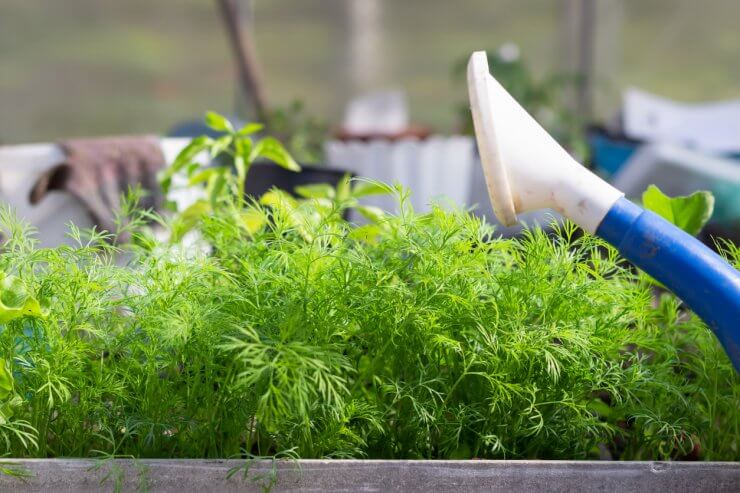
Healthy dill being watered
Unlike most food crops, dill resists most diseases. Your best weapons against the few that do bother dill are best planting practices, which help prevent disease in the first place.
This is especially important, as there are no fungicides approved for home use for many diseases.
These best practices are aimed at producing strong, healthy plants that can withstand disease, and at avoiding situations that contribute to the development of disease. They involve keeping plants clean, dry, and undamaged.
Watering: Water your dill plants deeply about once every two weeks (check the soil for dryness). Do not over-water; dill doesn’t like it and soggy soil invites disease.
Mulch: Mulch can help with water retention—but be vigilant and check for insect or fungal activity.
Other best practices include:
- Buy healthy, disease-free plants and seeds from reputable sources
- Plant your dill in full sun
- Plant in sites with good drainage; if planting in open ground, choose a higher spot for better drainage and protection from cold air (but stake dill to hedge against strong winds)
- Harvesting frequently and removing infected plants and leaves
Common dill diseases
Here are some of the usual culprits that might infest your dill. Remember, it’s important to remove diseased flowers and leaves to prevent the spread of disease once it’s found its way onto your plant.
Fusarium Rot (Fusarium wilt, damping off)
Cause: Fungal infection of the soil
Symptoms:
- yellowing leaves
- wilting, withering, and dying foliage
- dark spots on seedling stems
How it Spreads:
- fusarium fungus lives in soil; spreads after heavy rain or irrigation
Treatment:
- remove and destroy all infected leaves or whole plants
Prevention:
- do not plant in areas where fusarium has been present
- plant in an area with good drainage
- disinfect garden tools, boots, etc.
Carrot Motley Dwarf disease
Cause: A combination of two viruses: carrot redleaf and carrot mottle
Symptoms:
- yellow or red leaf discoloration
- stunted growth
How it Spreads:
- aphid infestation carrying viruses from carrots
Treatment:
- insecticidal soap
Prevention:
- control aphids with insecticidal soap
- avoid planting dill near carrots
Downy Mildew
Cause: Fungus
Symptoms:
- yellow spots on foliage
- fluffy growth on underside of leaves
How it Spreads:
Treatment:
- pick off and dispose of affected leaves
- remove and destroy severely affected plants
Prevention:
- position plants to provide air circulation
- water early in the morning to allow excess moisture to evaporate
- avoid watering plants from above
- rotate crops
Powdery Mildew
Cause: Fungus
Symptoms:
- powdery growth on leaves and stems
- pale stalks (lack of chlorophyll)
- misshapen blossoms
How it Spreads:
- floats on air currents, usually in high humidity and warm temperatures
Treatment:
- if caught early, treat with sulfur, potassium bicarbonate, or a fungicidal spray that contains the active ingredient “chlorothalonil”
Prevention:
- avoid overfertilizing
- use disease-free seeds
- rotate crops
- remove weeds and debris from around plants
Which diseases have you had to handle on your dill plants? Please tell us how you prevent and handle diseases. If you spot other symptoms on your dill that are not mentioned here, contact your local extension center or garden center for a consult—and please let us know what you found.


 Previous
Previous

